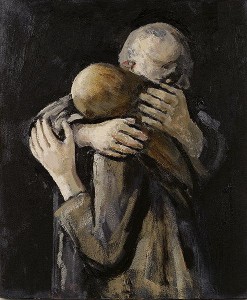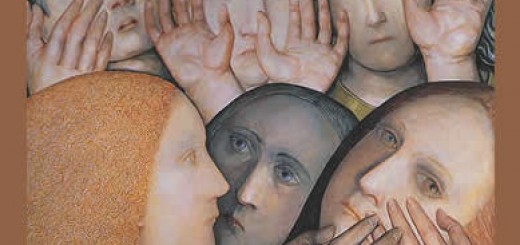Just being there
A couple of days after my mum died very suddenly, I was walking along Colchester High Street. I must have been going to our church for some reason, I don’t remember why. And I saw someone from church – it’s weird, I don’t remember who, but I know for sure it was someone who knew me from church – coming towards me. They saw me. I saw them. They caught my eye. Briefly, very briefly. And then crossed the street to avoid speaking to me. They had no idea what to say, I guess. They were embarrassed by my tragedy. They were afraid of saying the wrong thing. They felt uncomfortable. That moment has stuck with me all this time.
It happens. When we are struggling to deal with a tragic loss, everyone gives us a wide berth. They ‘give us space’. They pray for us from a distance. They send flowers and cards with printed messages. Or maybe a text every now and then. But very few know how to just be there.
In the first poem in Lamentations, the poet expresses this sense of abandonment and isolation over and over again.
No one was there to help when the people needed it.
When her people fell into enemy hands,
there was no one to help her. Lamentations 1:7
The surrounding nations looked on and laughed at Jerusalem’s downfall and despised God’s people.
Her enemies looked at her
and laughed at her destruction.All who honoured her despise her,
for they have all seen her naked. Lamentations 1:7-8All my enemies have heard of my distress;
they rejoice at what you have done. Lamentations 1:21
No one came to comfort the people. No one.
Her fall was astounding;
there was none to comfort her. Lamentations 1:9
The people cried out to God for help.
“Look, Lord, on my affliction,
for the enemy has triumphed.” Lamentations 1:9“Look, Lord, and consider,
for I am despised.” Lamentations 1:11“See, Lord, how distressed I am!
I am in torment within.” Lamentations 1:20
The people cried out to anyone who was watching.
Is it nothing to you, all you who pass by?
Look around and see.
Is any suffering like my suffering
that was inflicted on me,
that the Lord brought on me
in the day of his fierce anger? Lamentations 1:12Listen, all you peoples;
look on my suffering. Lamentations 1:18
No one came to help or to comfort. No one. Not God. Not anyone.
This is why I weep
and my eyes overflow with tears.
No one is near to comfort me,
no one to restore my spirit.Zion stretches out her hands,
but there is no one to comfort her. Lamentations 1:16-17People have heard my groaning,
but there is no one to comfort me. Lamentations 1:21
 Comfort is a hard thing. It means different things to different people at different times. It’s hard to get it right. So we often avoid trying at all for fear of getting it wrong.
Comfort is a hard thing. It means different things to different people at different times. It’s hard to get it right. So we often avoid trying at all for fear of getting it wrong.
And people have their own lives to lead. It amazed me that when my world fell apart when my mum died. Everyone else’s lives carried on functioning as normal. I remember standing in a supermarket and wanting to shout ‘Stop! Don’t you know my mum has died? Stop what you’re doing! This isn’t right!’ Life goes on all around us when our life is at a standstill.
No one understands. No one can begin to understand. Whatever you have been through, it is never going to be exactly the same as what I am going through.
So don’t tell me you know. Don’t tell me it was just the same when….That doesn’t help at all. Don’t ask me to imagine how you felt when….I’m not interested in that right now. Don’t tell me it’s all going to be OK and I’ll feel differently….I can’t begin to believe that right now. Just be there.
On the day my dad died, I went to my dance class as normal in the evening. I went with my friends Lorna and Becky. They were great. Quietly supportive and compassionate without really saying anything. Not carrying on as if nothing had happened, not fussing, not criticising me for being there, just accepting and supporting and loving. Looking out for me. Sensitive to my situation. Aware of how fragile I may be. I loved that. It was just what I needed.
A while back, I knew a couple – not that well, at that stage – from church, who experienced the horrific tragedy of a childbirth. I had no words. Of course, I didn’t. But once a week for a lot of weeks, I used to pick this grieving woman who I hardly knew up and take her for a walk. Sometimes she talked. Sometimes not. Occasionally I talked. I learnt to just be there. To be a body to talk to and walk with – a listening ear, I suppose. Maybe that was just what she needed.
Yes, it’s hard and uncomfortable and scary and distressing to be there, but I knew firsthand how isolating grief can be. Grief can be messy and raw and confusing and frustrating and demanding and deeply sad.
But we are called to just be there.
Whatever that looks like.












